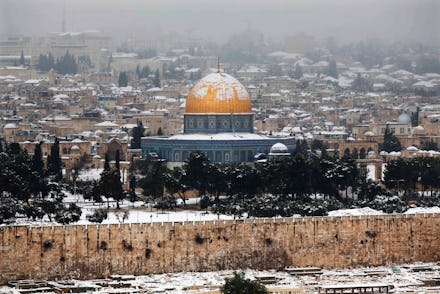Why We Should Worry About Last Week's Historic Snowfall in the Middle East

"There was snow happening before, but not like this one," said Sami Abu Heiba, 26, who lives in a village just outside Ramallah, a city in the Palestinian territories. He describes a typical snow as maybe "last[ing] for hours, or a day maximum. It doesn't close the roads, it doesn't [break] the trees."
Historic winter storm Alexa and her fallout brought such conditions to a wide swath of the Middle East over the last week as it hit Egypt, Turkey, Iran, Israel, Syria, Jordan, and Lebanon. Israel had not experienced such a heavy December snowfall since 1953. The Palestinian media, says Abu Heiba, has reported that the last snowfall of this magnitude happened 140 years ago. While scientists are cautious about linking specific weather events to climate change, this unusual snowfall may be tied to a warming planet.
Scientists say that as climate change spikes temperatures around the world, the atmosphere is able to hold more moisture. This increases the chance for heavier-than-normal snowfall, especially in places that experience cold temperatures already, like the United States' Midwest. In places where it is normally too warm to snow anyway, this doesn't usually make a difference, except for when a freak cold weather system moves through, as what may have happened with Alexa.
"We have seen some indication that the amount of water vapor is already increased in the atmosphere, probably in response to increasing global temperatures," said Kenneth Kunkel, an expert on extreme weather events and senior scientist at the Cooperative Institute for Climate and Satellites, administered in part by the National Oceanic and Atmospheric Administration. "So this event that occurred in the Middle East, there may have been a little more moisture around than the case 30 or 40 years ago for the same event. And so that might have contributed to the amount of snow they got."
The snow has prevented Bil'in resident Jaber Abu Rahmeh, who is 25, from getting to the doctor despite having the flu and a stomach problem that keeps him up at night.
Abu Rahmeh, along with many others, had no electricity for four days. He's not used to the cold, he says, and wears a hat and layers inside, even though the heat works inside his home. Despite reports of some collaboration during the storm, Abu Rahmeh says his Israeli-run electric utility lagged in getting power back to its Palestinian customers in the West Bank, even as power supply and infrastructure proved more robust in Israel.
"They didn't give any help to the Palestinian in this kind of weather," Abu Rahmeh said. "There is no kind of communication. No land phones, no cell phones, no internet, nothing. And they can have anything."
For those with less resources at hand, the storm has more dangerous implications. Among Syrian refugees in Lebanon, according to the New York Times:
"Families huddle in shacks that they built themselves, stitching together burlap sacks or hoisting bright plastic tarps advertising goods they cannot afford. Some of the shelters have flooded, their dirt floors covered with soggy cloth, and their occupants fear that as more snow piles on, they will collapse."
It's a well-known argument that natural disasters can work to exacerbate existing crises. And such cases are likely to continue cropping up. While climate change may have intensified this storm, its longer term effect on the Middle East's looks different than the photos circulating on the internet. Eventually, warming is expected to make cold weather like Alexa even rarer in the region than it is already. Higher and higher temperatures will first burn off any existing moisture in the semi-arid region, even puddles and plant-stored water, says Kevin Trenberth, senior scientist at the National Center for Atmospheric Research.
"Once it gets to a wilting point, then there's no more moisture, and that's when things really warm up," Trenberth warns. "In the Middle East … there are some desert areas, water is a substantial issue, there's a lot of shortages, there's not a lot of vegetation out in the open country. So it's already dry and any extra heat then indeed can lead to more extremes on the warm side."
Though now preoccupied by a snow like he has never seen before, it's not too hard for Abu Heiba to imagine such a scenario.
"It's everybody's fault," he said. "We're just very bad with our Mother Nature. We are just now paying back."